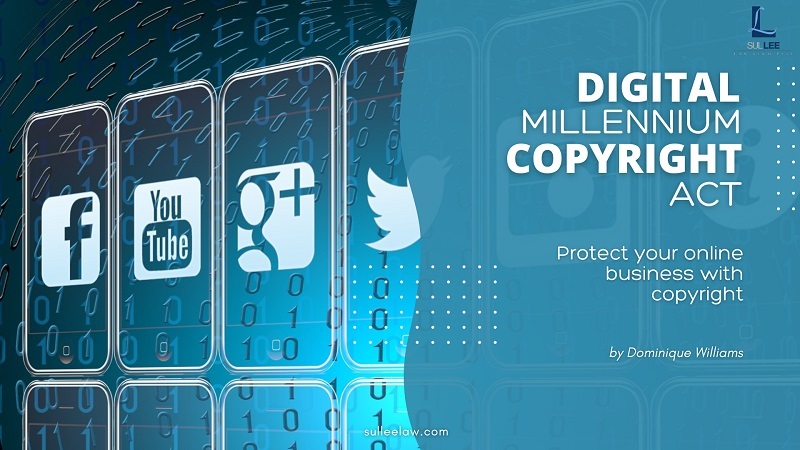Understanding copyright infringement laws can be challenging. So, we put together an informational guide detailing the Digital Millennium Copyright Act (DCMA). With this guide, hopefully you’ll have a better understanding of copyright infringement and what you can do if someone has infringed your copyright.
If you have more questions about copyright infringement or need help addressing other business law issues, contact a business law attorney from Sul Lee Law Firm. Call us today to schedule a consultation.
What Is a Copyright?
A copyright is a type of intellectual property that gives the copyright holder the exclusive right to:
- Reproduce the copyrighted work in copies or phonorecords
- Prepare derivative works based on the copyrighted work
- Distribute copies of the copyrighted work to the public
- Publicly perform literary, musical, dramatic, choreographic works, pantomimes, motion pictures, and audiovisual works
- Perform the copyrighted work publicly by means of a digital audio transmission
- Permit third parties to do any of the above actions
How Do You Acquire Valid Copyrights?
To be eligible for copyright protection in the United States, the work must:
- Be fixed in a tangible medium,
- Be created by a human author, not a mere mechanical process without any creative input or intervention from a human author
- Contain a minimum amount of creative authorship, that is, the work is original to the author and has a modicum of creativity, and finally,
- The work has to fall within one of the categories of copyrightable subject matter.
What Types of Works Are Eligible for Copyright Protection?
- Literary works
- Musical works
- Dramatic works
- Pantomimes
- Choreographic works
- Pictorial, graphic, and sculptural works
- Motion pictures and other audiovisual works
- Architectural works
What Types of Works Are Not Eligible for Copyright Protection?
A work is not eligible for copyright protection if it is:
- Just an idea
- A functional object, system, algorithm, and other scientific concepts
- Something that can only be expressed one way
- Functional and not aesthetic
How Do You Register Copyrights?
To register a work for copyright protection, a party can submit a copyright application on copyright.gov. You must submit a completed copyright application form, which can be found in the Forms section of the copyright.gov website, along with a nonreturnable copy of the work to be registered.
Why Is Registering a Work Important?
Registering a work is important because while copyright protection subsists automatically, the work must be registered to pursue infringers and to receive statutory remedies.
Remedies for infringement of a copyrighted work include:
- Temporary and final injunctions to prevent or restrain infringement of a copyright
- Impounding and disposition of the infringing items
- Recovery of actual damages and any additional profits of the infringer or statutory damages
Is There a Deadline to Bring a Copyright Infringement Action Against an Infringer?
Yes. 17 U.S.C. § 507 provides that criminal proceedings pursuant to 17 U.S.C § 506 shall be brought within five years, while civil actions shall be brought within three years of the date that the copyright holder becomes aware of the infringement.
How Long Is Copyright Protection Valid?
Copyright protection is valid for the life of the author plus 70 years following the author’s death.
What Happens When the Copyright Term Ends?
After the copyright protection ends, the author’s work enters the public domain, and the author no longer has the sole and exclusive rights to:
- Reproduce the copyrighted work in copies or phonorecords;
- To prepare derivative works based upon the copyrighted work;
- To distribute copies of the copyrighted work to the public;
- To publicly perform literary, musical, dramatic, and choreographic works, pantomimes, motion pictures, and audiovisual works.
- To perform the copyrighted work publicly by means of digital audio transmission, and
- To permit third parties to do any of the above actions.
A.A. Milne’s Winnie the Pooh, F. Scott Fitzgerald’s The Great Gatsby, and William Shakespeare’s Romeo and Juliet are examples of works that are in the public domain. When a work enters the public domain, other users can use the works without legal repercussions.
How Does the Digital Millennium Copyright Act Help Copyright Holders?
The Digital Millennium Copyright Act (DMCA) is a law enacted in 1998 that was meant to address issues with copyright ownership in the digital age. The law has several different titles, each of which serves a different purpose.
Title I implements the World Intellectual Property Organization (WIPO) treaties.
Title II limits the liability of online service providers against copyright infringement if they abide by the safe harbor guidelines.
Title III permits copies of computer programs for the purpose of repairing a computer.
Title IV contains six miscellaneous provisions, which:
- Explain and increase the duties of the Copyright Office
- Exempt digital transmission recordings
- Facilitate distance education
- Expand the archiving methods allowed by libraries
- Create an exception for webcasting
- Address concerns about the payment of actors, directors, and writers when movies are exploited
Title V protects boat hull designs.
How Do You Report DMCA Violations to Online Platforms?
Online platforms have policies designed to prevent the infringement of registered copyrights.
To report a DMCA violation, you must file a DMCA notice providing the online service provider with information such as:
- A description of the copyrighted works
- A description of where the infringing material is, including links to the infringing material or other source identifiers, like message links
- A statement that you have a good faith belief that the use is not authorized by the copyright owner or its agents
- A statement made under penalty of perjury that you either own the copyright or are authorized to act on the copyright owner’s behalf
- Your name and contact information
- Your physical or electronic signature
Online platforms are incentivized to promptly revaluate and respond to DMCA violation notices, as if the platform fails to take remedial action, they cannot invoke the DMCA’s safe harbors and can be held contributorily liable for copyright infringement. Upon receiving a DMCA Takedown Request, online service providers will diligently evaluate your claims and remove any infringing material.
If you need help with this process, contact a business law attorney from Sul Lee Law Firm today.
Contact Sul Lee Law Firm Today
The ins and outs of copyright infringement can be overwhelming. If you need help understanding the DMCA United States copyright law or bringing an action against a copyright infringer, you can rely on the lawyers at Sul Lee Law Firm. We will help you seek copyright infringement liability.
If you have more questions, contact a business lawyer from Sul Lee Law Firm to schedule a consultation.

